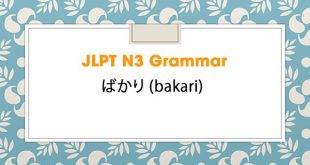ばかり (bakari) Meaning: only; nothing but How to use the: Noun + ばかり Verb (て form) + ばかり Explain: Use when the speaker is criticize about the situation, the situation is repeated, or always lies in that state Example sentences: 1, 弟は漫画ばかり読んでいる Otōto wa manga bakari yonde iru My younger …
Read More »Grammar
JLPT N3 Grammar: ば~ほど (ba~hodo)
ば~ほど (ba~hodo) Meaning: the more… the more How to use the: Verb-ばconditional + (same) Verb + ほど いadj-ばconditional + (same) いadj + ほど なadj + なら + (same)なadj + なほど Explain: ~ Usable as ~たら/なら~ほど with the noun (~たら/~たら) and the verb (~ら) Example sentences: 1, 食べれば食べるほど太る。 Tabereba taberu hodo …
Read More »JLPT N3 Grammar: のように/のような (no you ni/no you na)
のように/のような (no you ni/no you na) Meaning: like; similar to How to use the: Noun + のような + Noun Noun + のように + Verb/Adjective Example sentences: 1, 彼は何も知らなかったのような振る舞っていた。 Kare wa nani mo shiranakatta no you na furumatte ita. He behaves like he knows nothing 2, あの人のような英語がペラペラ話せたらいいのに。 Ano hito no you …
Read More »JLPT N3 Grammar: によって (ni yotte)
によって (ni yotte) Meaning: by means of, due to, owing to, because of How to use the: Noun + によって Explain: Used to indicate the cause and reason. Used to indicate the subject of the action. Used to indicate methods and methods Example sentences: 1, 日本は津波によって大きな彼我を受けました Nihon wa tsunami ni …
Read More »JLPT N3 Grammar: ないで (naide)
ないで (naide) Meaning: without doing~ ; don’t How to use the: Verb (ない form) + で Explain: Most only use commands and requests Example sentences: 1, 止まないでください。 Yamanaide kudasai. Do not park (car) 2, 話さないでください Hanasanaide kudasai Please do not talk 3, 「タバコを吸わないでください」という標識があった。 `Tabako o suwanaide kudasai’ to iu hyōshiki …
Read More »JLPT N3 Grammar: てはじめて (te hajimete)
てはじめて (te hajimete) Meaning: not until; only after… did I How to use the: Verb-てform + はじめて Explain: Used to express in the case that: After actually doing something (which has not been done before), it becomes a different state. Example sentences: 1, 働くに入ってはじめて彼と知り合いになった。 Hataraku ni haitte hajimete kare to …
Read More »JLPT N3 Grammar: らしい (rashii)
らしい (rashii) Meaning: seem like; look like; I heard that; it appears that; it seems like How to use the: Verb-casual + らしい Noun + らしい いadj + らしい なadj + らしい Explain: Used to express what the speaker sees, heard, feels Example sentences: 1, 天気予報によると明日は雨らしい。 Tenkeyohō ni yoru to …
Read More »JLPT N3 Grammar: とても~ない (totemo~nai)
とても~ない (totemo~nai) Meaning: cannot possibly; there is no way Explain: Used to express strongly that something is impossible to do Example sentences: 1, こんな難しい問題はとても私には解けません。 Kon’na muzukashī mondai wa totemo watashiniha tokemasen. A difficult math problem like this, I can’t solve 2, あの美しさはとても言葉では表現できない。 Ano utsukushi-sa wa totemo kotobade wa hyōgen dekinai. …
Read More »JLPT N3 Grammar: ことになる (koto ni naru)
ことになる (koto ni naru) Meaning: it has been decided that…, it has been arranged so that…, it turns out that… How to use the: Verb-casual, non-past + ことになる Explain: Use when showing that the event has been sorted and decided. Use when you want to say: from a certain situation, …
Read More »JLPT N3 Grammar: ようになる (you ni naru)
ようになる (you ni naru) Meaning: to reach the point that, to come to be that, to turn into How to use the: Verb-dictionary form + ようになる Verb-ないform + ようになる Explain: Used to express a transform or change Example sentences: 1, 日本語が上手に話すようになりたいな。 Nihongo ga jōzu ni hanasu yō ni naritai na. …
Read More » Learn Japanese Free Learn Japanese Free
Learn Japanese Free Learn Japanese Free










